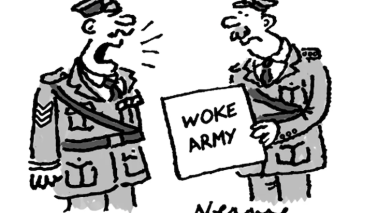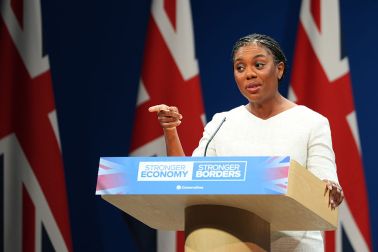At Guildhall on Tuesday, the Centre for Policy Studies held its Margaret Thatcher Conference on Security. Its title is an implied reproach to the way security is seen by current governments. You couldn’t have a Barack Obama Conference on Security, or a Donald Trump one, because neither cares about the subject. You could, I suppose, have a Theresa May Conference about Security, but that would have nothing to say about international institutions and alliances, the values of democracy, totalitarian ideology, and the needs of global defence. It would concern itself with second-order subjects like the surveillance of terrorist suspects and the state of deportation law. Many have complained that the Tory election campaign failed to preach any Conservative economics. Ideas about the security of the West were even more notably absent. Jeremy Corbyn was allowed to get away with the suggestion that his party could remain committed to Britain’s independent nuclear deterrent, but that he, as a unilateralist prime minister, would never permit its use. It is questionable whether western governments have the political will to act if some aggressive power — probably Russia — decides to kick the door down. It may not even need to bother to kick. After speaking at the Thatcher conference, I went off to lunch in the House of Lords. My host had ceased to receive emails because the parliamentary computers were down after an allegedly Russian cyber attack.
When I first started reading this paper in the 1970s, it contained many articles about the decline of the West. Fans of Alexander Solzhenitsyn lamented our spiritual decadence. Learned authors compared us with 18th-century Spain, made rotten by too much ready silver from Latin America. The Soviets were advancing in southern Africa and Nicaragua. They invaded Afghanistan. It looked grim, but conservatives argued that the West could prevent it if only we had enough cultural confidence and weapons. We recovered both in the 1980s. Today, we face more diverse threats and have no agreed remedies. Indeed, you could argue that Mr Corbyn has a more coherent idea of security than any other leader of a major western party. His consistent theme is that Anglo-American imperialism is the only danger to the world.
In my Thatcher researches, I find him popping up from time to time in the 1980s. In early November 1987, for example, an enormous shipment of Libyan arms and Semtex to the IRA was intercepted, revealing that earlier shipments had got through. On 8 November, in Enniskillen, an IRA bomb detonated during the Remembrance Day ceremony, killing 11 people, including the 20-year-old Marie Wilson. Mr Corbyn, plus Tony Benn, George Galloway, Dennis Skinner, Diane Abbott etc, signed a Commons early day motion expressing ‘horror’ at ‘continuing loss of life’ in Northern Ireland and explaining that it ‘stems primarily from the continuing British occupation of that country and the partition imposed by force in 1921’. So it was really the fault of the British government that British citizens wearing poppies got blown up. This way of looking at the world has stood Mr Corbyn in good stead. Today a similar narrative implies that Britain is forcing Muslims to blow up children in a concert hall or stab people on our streets. Some may think it surprising — even disgusting — that he can get away with this. But he has a story to tell, and the decent people don’t. In those gloomy articles in the late 1970s, authors over-quoted Yeats’s line about the best lacking all conviction and the worst being full of passionate intensity. I notice they are doing so again today.
At the security conference on Tuesday, I chaired a discussion on ‘Values: what should the West stand for?’, with terrific contributions by Bishop Richard Chartres, Rabbi Lord Sacks and Anne Applebaum. In the midst of talk about the importance of recognising faith as a source of values, I raised a delicate point. On Sunday, in Small Heath Park, Birmingham, a crowd, claimed to be 100,000-strong, gathered for the festival of Eid al-Fitr. Media photos showed the crowd praying. What does a non-Muslim British citizen feel at such a scene? The honest answer would probably be ambiguous. On the one hand, this was a dignified and peaceful display of a faith free to benefit from our cherished freedom to worship. On the other, it was a show of strength. Those at prayer — only men, in the photographs — were laying claim to the public space, rather as Orange and Republican parades (the great majority of which pass off without incident) compete to do so in Northern Ireland. Given the ferment in Islam across the world, can one feel completely easy about its growing power here? The rabbi and the bishop replied that the Abrahamic commonality between their faiths and Islam was what must always be emphasised, and eschewed any words that might divide. That is surely the best religious answer. But I must admit that it does not set my heart completely at ease.
People like Philip Hammond say that we must at all costs avoid a ‘cliff-edge’ in the Brexit negotiations. But the more dangerous cliff-edge is the political one. If, having voted to Leave, we do so in name but not in fact, the elites will have frustrated the ballot box, and faith in the democratic process will plunge to its death. This is Holmes versus Moriarty at the Reichenbach Falls. Just now, Moriarty has the upper hand. But remember that Holmes survived, because Conan Doyle had to revive him — by popular demand.
The phrase ‘bucket list’ entered the language early this century, and you now hear it most days. It means your self-chosen list of the things you must do before you die. There is something wrong about the psychology behind this. More of us are troubled by doing too much, not too little. Life involves innumerable lists of tasks, and this makes one ill-prepared for death. The best bucket-shop list of things to do would simply say ‘Less’.







Comments